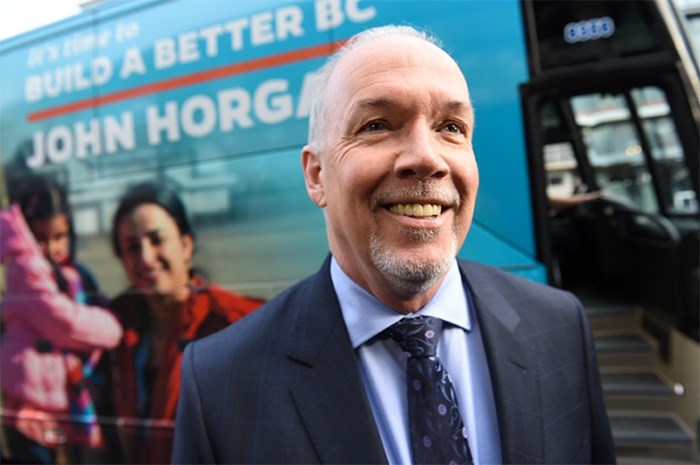 Premier John Horgan, file photo Dan Toulgoet
Premier John Horgan, file photo Dan Toulgoet
A ¬È∂π¥´√Ω”≥ª≠city councillor says his understanding is that Premier John Horgan will make a speech Friday at a gathering of municipal politicians that will commit to ‚Äúan action‚Äù that addresses the region‚Äôs homelessness crisis.
But Vision ¬È∂π¥´√Ω”≥ª≠Coun. Raymond Louie, a longtime supporter of the NDP and colleague of Horgan‚Äôs chief of staff Geoff Meggs, wouldn‚Äôt elaborate further on what Horgan is expected to reveal at the Union of B.C. Municipalities conference in Vancouver.
The premier is scheduled to make a speech Friday morning to close the week-long conference that has attracted municipal and provincial politicians from across the province.
‚ÄúHe‚Äôs going to, I think, commit to an action to deal with the homelessness issues, as he did during the election, and I look forward to getting the public details,‚Äù Louie told the Courier after a news conference Tuesday at which the Metro ¬È∂π¥´√Ω”≥ª≠agency released a final report on the region‚Äôs homeless count. A total of 3,605 people ‚Äî 2,138 in ¬È∂π¥´√Ω”≥ª≠‚Äî were identified as homeless in the March count, a 30 per cent increase over a count in 2014. ‚ÄúI can tell you, that at the city of Vancouver, we‚Äôve been working very closely with B.C. Housing [the government‚Äôs housing branch]. They‚Äôve been very responsive to our needs when we‚Äôve identified issues. It has been very good in the last couple of months.‚Äù
Three weeks ago, the Horgan government announced $291 million towards the construction of 2,000 modular housing units for people who are homeless. An additional $170 million was promised to pay for around-the-clock staffing and support services, such as health care, for tenants.
The government also committed $208 million to fund more than 1,700 new units of affordable housing. But Horgan and his cabinet have yet to reveal which municipalities will receive funding for both commitments, although Housing Minister Selina Robinson told the Courier last week that ¬È∂π¥´√Ω”≥ª≠was ‚Äúat the front of the list.‚Äù
The city is on record of wanting to get 600 modular units built and open in ¬È∂π¥´√Ω”≥ª≠before winter arrives. The self-contained suites, which can be built quickly and moved from site to site, would be for homeless people and those who live in shelters.
The Metro ¬È∂π¥´√Ω”≥ª≠homeless count report showed the need for a massive influx of housing and services to get people off the street and out of shelters and other forms of temporary housing.
Reporters heard from mayors and community leaders that skyrocketing house prices and rents, along with a tight rental market and unemployment, were connected to the continued growth in homelessness.
Addiction and mental illness were also factors, with 82 per cent of respondents dealing with at least one health condition. The report noted an increase in homeless seniors and Indigenous people, who represented 34 per cent of people counted, yet only make up 2.5 per cent of the region’s population.
Half of the people counted by volunteers and who agreed to be interviewed said they had lived in the region for at least 10 years before becoming homeless. About 15 per cent of respondents said they earned income from binning and bottle collecting. Another 22 per cent were employed full or part-time.
Homelessness increased in all communities, except the North Shore. ¬È∂π¥´√Ω”≥ª≠(up 335 people from the 2014 count), Surrey (up 199) and Langley (114) saw the biggest increases in homelessness.
Port Coquitlam Mayor Greg Moore, who doubles as chairperson of Metro Vancouver, said homelessness brings additional costs to municipal governments, which are not properly staffed or funded to deal with an influx of people living on the streets.
‚ÄúSimply responding to demands of a homeless person costs approximately $55,000 annually compared with $37,000 to house them,‚Äù he told reporters. ‚ÄúEvery municipality throughout Metro ¬È∂π¥´√Ω”≥ª≠is using every tool in their authority to expedite developments and build appropriate housing, where offering density bonuses and other incentives to developers to help with the lack of affordable housing.‚Äù
In February, the region‚Äôs mayors issued a damning report on the state of homelessness in Metro ¬È∂π¥´√Ω”≥ª≠that was aimed at the then-Christy Clark government for what they said was an inadequate response to the homelessness crisis.
At the time, there were more than 70 homeless camps in the region, with the mayors estimating 4,000 people were in need of a home in Metro Vancouver. They said shelters were at 97 per cent capacity and approximately five people per week were becoming homeless in the region. Another 10,000 people are on B.C. Housing’s waiting list for a permanent home.
Read more from the


